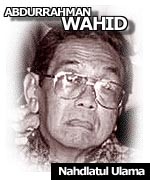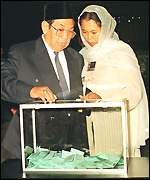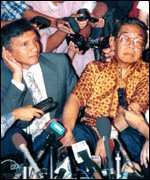Abdurrahman Wahid
- profile of the president
 |
|
Abudarraham Wahid, elected Indonesia's fourth president, has
taken office after months of prevarication over whether he would
actually stand.
The election of the influential Muslim
cleric came as a shock to many after
Megawati Sukarnoputri's PDI-P party
had emerged as the winner of Indonesia's elections in June.
|
Abdurrahman
Wahid, or Gus Dur as he is also known, is one of the most
well known figures in Indonesia.
Educated in Indonesia, Egypt, Iraq and Canada, the frail
59-year-old has long had a reputation for religious tolerance and moderate politics.
Nearly blind, he has suffered two strokes in recent years and had to be helped to the
ballot box in the national assembly.
Wahid heads Indonesia's largest Muslim organisation, the Nahdlatul Ulama, or
NU, which draws its support of at least 30 million members from Muslims in the rural areas of
Java, Indonesia's main island. But that position as a moral leader was transformed when he and
his supporters formed the National Awakening Party, PKB, following the dramatic fall of President
Suharto.
Opposition to Islamisation
While NU is a conservative religious organization, Wahid has
consistently maintained that faith is a personal matter.
In the unrest surrounding the fall of Suharto, some politicians
made increasingly vocal calls for Islam to have an
institutionalised role in the state.

Frail : A question mark hangs over
Wahid health |
|
But such a move, Wahid believes, could spell the end of
Indonesia, already troubled by ethic separatism and inter-religious
tension.
"If the new parties want Islam to be a
moral or educational force in politics,
that's ok", he recently said, "but if they want to tinker with the laws of
this country, then we must resist that". |
His stance has brought him criticism from Islamic circles but earned him
the respect of many non-Muslims throughout Indonesia, including the vast democracy's Christians
and ethnic Chinese who he described as vital for the national
economy.
Perhaps more significantly, he has taken office after having
forged links with the nation's highly influential military elite
through his joint work with the head of the armed forces General Wiranto to ease ethnic tensions.
As the election drew closer, he told the Wall Street Journal: "If
my party gains power, we will calm Indonesia."
Ties with Megawati

Rivals : Amien and Wahid teamed up
during election |
|
Wahid has had previous close ties with Megawati. In the run-up
to the poll in the summer, she considered him one of her key allies,
a man who could potentially deliver a huge Muslim following but who would
be content to follow secular policies.
During the campaign, he, Megawati
and Amien Rais, Wahid's rival Muslim leader, brought their parties
together in the name of safeguarding the reform and democracy process. |
But the joint front did not last, and Wahid later argued that a female
president would offend conservative Muslims.
Their friendship soured further as Wahid came to regard
Megawati as arrogant and unable to work with other politicians
as they sought to form a new government. Economically, Wahid pledged during campaigning to implement
reforms which the International Monetary Fund says are vital for the battered economy of 17,000 islands.
Suharto talks
Wahid's most controversial moves in recent years have all been
linked to the Suharto clan. In 1997, he campaigned with the former president's daughter during parliamentary
elections.
More recently, his conciliatory gestures towards the deposed
President Suharto have angered those who supported "reformasi".
Some of his own NU members regarded his attempts to involve the former president in a national reconciliation dialogue as
unhelpful towards the reformist camp when the opposition had been trying to pressure President Habibie to properly investigate
Suharto era.
Despite this, his appeal within NU is undiminished, and many
Indonesians backed the PKB because he appeared the
champion against the Islamist camp.

|

